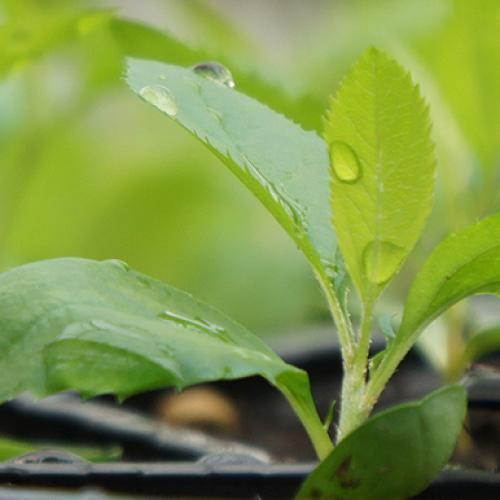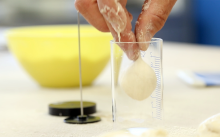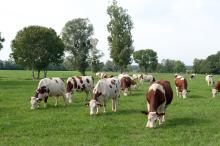Research conducted in the Pays de la Loire Centre

Centre identifiers
The Pays de la Loire Center includes its research activities in the three scientific fields of the Institute: Agriculture, Food and Environment through 4 identifiers, one of which is shared with the INRAE Bretagne-Normandie Center:
- Plant biology and sustainable management of horticultural crops and seeds
- Bio-resource engineering for innovative foods and materials
- Animal health - food safety - food - human health: biology and interactions
- The economics of farming and agri-food industries, public policies for agriculture and the environment (shared with the INRAE Bretagne-Normandie Centre).
Plant biology and sustainable management of horticultural crops and seeds
The quality and health of horticultural products and seeds is a key factor in developing highly effective, healthy and sustainable production systems in these sectors, both for food and ornamental plants. The sectors in question are characterised by a broad spectrum of production systems and intensive production methods in rural, suburban and urban settings. Achieving quality is dependent on efficient, integrated management of development processes for both plants and their resistance to aggression, as well as seamless management of the pathogens themselves.
Research Units : UMR IRHS, UPR BIA (teams PVPP and ELIPS), USC SIFCIR, USC LEVA, UE HORTI, bi-regional units BAGAP et IGEPP
Bio-resource engineering for innovative foods and materials
Against a backdrop of changing demographics and diet habits, environmental and energy considerations, and increasing awareness of the impact these factors have on public health, stakeholders in agriculture, agri-food and agri-forestry in the 21st century need to face up to a major challenge for the sustainability of production and food chains.
Research Units : UPR BIA, USC GRAPPE
Animal health - food safety - food - human health: biology and interactions
Our work contributes on the one hand to integrated management of animal health and its impact on our diet, and on the other to understanding the relationship between human health and what we eat. Involved in this idea of “One health”, the centre’s units also contribute to strengthening the link between animal health and human health.
Research Units : UMR BIOEPAR, UMR LABERCA, UMR PHAN, UMR PANTHER, UMR SECALIM, USC IECM, USC StatSC, UPR BIA (team Allergie), USC URSE
The economics of farming and agri-food industries, public policies for agriculture and the environment
In this area, we undertake all of our research work jointly with the Brittany-Normandy INRAE centre. It is undertaken in a context of increasing interna- tionalisation of markets, increased competition between EU Member States, increased price vola- tility and increased citizen awareness of public health, environmental and animal welfare issues.
Research Units : UMR SMART LERECO (bi-régional unit), UMR BIOEPAR (economics and management of the Herd Health team - Public Health)
Centre Activity Report
A continuum of achievements between research, expertise and innovation in the context of agricultural, food, ecological and energy transitions. The activity report of the INRAE Pays de la Loire center will allow you to take the measure of the actions that have been carried out by a community of more than a thousand people on 2 main sites: Angers and Nantes.
Rapport d'activité centre Pays de la Loire pdf - 18.42 MBResearch infrastructure of the centre
Biopolymers structural biology Plateform - BIBS
Recognized as a "strategic platform of INRAE", BIBS is ISO 9001 certified, IBiSA labelled and integrated into the national infrastructure PHENOME- EMPHASIS-FR and the Biogenouest network.
The BIBS platform develops and proposes methods for the multi-scale characterization of biopolymers (polysaccharides, lipidic polymers, proteins) using different analytical modalities. Combined, these different modalities allow access to the composition and structure of biopolymers but also to their organization (assemblies, interactions), their localization, their dynamics. The study systems are of biosourced origin, natural (terrestrial or marine plants, plant organs, cells, etc.) or transformed (food, food matrices, biomaterials, etc.).
The challenge is to understand the role of structuring at different scales on the properties of these systems to better control their construction and deconstruction, functions and use.
Read more: https://www.bibs.inrae.fr
Phenotyping of seeds and seedlings Plateform - PHENOTIC
The PHENOTIC platform has been awarded the IBiSA label. It is part of the national infrastructure PHENOME-EMPHASIS-FR and the Biogenouest network.
PHENOTIC brings together phenotyping tools based essentially on image acquisition and processing for the phenotyping of seeds, seedlings and whole plants. Phenotyping on seeds and seedlings aims at obtaining phenotypic parameters characterizing the quality of seeds. Phenotyping on whole plants aims to propose tools for phenotypic analysis of host-pathogen interactions and the quality of horticultural productions.
Such a phenotyping activity for specialized plant-horticulture and seed production is integrated in activities of: (i) Species characterization and genetic diversity, varietal selection; (ii) Study of genetic determinism (QTL); (iii) Parameterization for modeling; (iv) Comparison of virulence, aggressiveness of pathogens; (v) Evaluation of the vigor of seed lots.
The platform is supported by a multidisciplinary team to promote the coupling between plant biology and information and communication sciences and technologies (image processing, data processing). It is available for partnership-type actions in research programs or for service provision.
Read more: https://www6.inrae.fr/phenotic
Analytical chemistry Platform
The platform has been certified ISO 9001 and awarded the IBiSA label for its structural and metabolomic analysis activities; it is integrated into the Biogenouest network.
LABERCA, through its analytical chemistry platform (PFCA), puts its know-how and its instruments at the service of its research activities and of the research and industrial community. Its varied and powerful mass spectrometry equipment (low or high resolution, simple or multidimensional, isotopic) coupled with all forms of chromatography (gas or high performance liquid phase, SFC) responds to the numerous requests of the community. The PFCA integrates activities related to structural analysis, assay and metabolomic/lipidomic analysis. In addition, LABERCA has expertise in the field of steroids, which adds to the PFCA's services.
Read more: https://www.laberca.org/accueil-laberca/
Pathological anatomy Platform - APEX
APEX is ISO 9001 certified, IBiSA labeled and integrated into the NeurATRIS national infrastructure, the Biogenouest network and the Nikon Center of Excellence since May 2016 for biphoton microscopy.
The main mission of the APEX platform is to provide research teams with expertise in animal histopathology and tissue and cell phenotyping in a wide range of animal species. APEX also offers developments in high-tech microscopy - spectral confocal microscopy, super-resolution and multiphoton microscopy - in response to scientific imaging problems.
Read more: https://www6.inrae.fr/anatomie_pathologique_sante_animale
Research Units
The center has 17 research units (including 1 INRAE unit, 6 mixed research units, 6 units under contract), 1 experimental unit and 3 support units
Research units
INRAE unit
-
Biopolymers, interactions and assemblies (BIA) - INRAE >>>
Joint research units
- Biology, epidemiology and risk analysis in animal health (BIOEPAR) - INRAE - ONIRIS >>>
- Research Institute of Horticulture and Seeds (IRHS) - INRAE-AGROCAMPUS OUEST - UNIVERSITE D'ANGERS >>>
- Laboratory for the study of residues and contaminants in foods (LABERCA) - INRAE - ONIRIS >>>
- Animal physiopathology and biotherapy of muscles and nervous system (PANTHER) - INRAE - ONIRIS
- Physiopathology of nutritional adaptations (PHAN) - INRAE - UNIVERSITE DE NANTES >>>
- Food safety and microbiology (SECALIM) - INRAE -ONIRIS >>>
Contracted unit
- Agri-food products and processes research group (GRAPPE) - INRAE - ESA
- Cellular and molecular immunology-endocrinology (IECM) - INRAE - ONIRIS
- Pulses, plant ecophysiology and agri-ecology(LEVA) - INRAE - ESA
- Ion channel and receptor functional signalling (SIFCIR) - INRAE - UNIVERSITY OF ANGERS
- Statistics, sensometry and chemometry contracted unit (StatSC) - INRAE - ONIRIS
- Livestock systems contracted unit (URSE) - INRAE - ESA
Expérimental unit
- Horticultural (Horti) >>>
Support units
- Deconcentrated Research Support Services (SDAR)
- Transformation process of organic matter into food and bio-sourced products; valorization of residues from human activity (TRANSFORM)
- Interregional IT Service Grand-Ouest (SIIR-GO)
- Nantes branch office DRHDD



